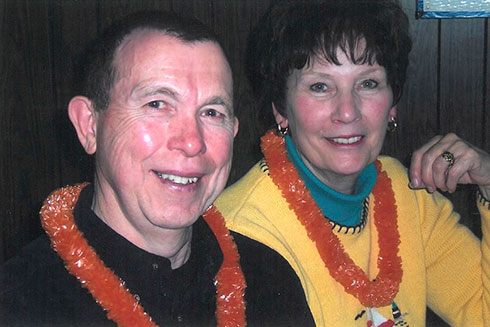Routine Colonoscopy Leads to Shocking Diagnosis

It started on the first anniversary of 9/11. Duane Johnson, a retired schoolteacher, wanted to make a difference. He stopped by a local Red Cross blood drive and rolled up his sleeves. From there on out, it became a trend.
"I pretty much donated blood every 53 days or so," says Johnson. "It's easy, painless and so important to the recipients. I enjoyed helping."
But, a few years ago, a routine visit to the Red Cross left Duane a bit concerned.
"They told me my iron count was low, which had never happened before," explains Johnson. "A couple months later, same problem. They told me to go home, eat some spinach and steak and come back. But, when I did, the same thing happened."
Johnson was due for his annual exam at Nebraska Medicine, so he scheduled an appointment with his primary care physician, Dennis Goeschel, MD, with plans to discuss this with him. In April 2014, hospital staff ran a series of tests, including a colonoscopy. Five days later, Johnson received a shocking call from his gastroenterologist, Gary Volentine, MD.
"They found lymphoma in my small intestine. I couldn't believe it," he recalls. "I was puzzled by my low iron count, and felt fatigued at times, but had no inkling that anything serious was wrong. At 69 years old, I just contributed it to getting older."
Dr. Volentine told Johnson, finding the lymphoma explained his anemia. He was immediately referred to Nebraska Medicine oncologist/hematologist Philip Bierman, MD, who was also surprised by the diagnosis.
"Lymphoma is very uncommon to find during a colonoscopy," explains Dr. Bierman. "Typically, when we perform a colonoscopy, we're looking for the more common types of colon cancer. Lymphoma would be an unexpected finding."
Dr. Bierman decided the best course for treatment would be six sessions of chemotherapy. Johnson lost his hair, along with his appetite.
"At first, chemo affected my taste buds and made me feel like a groggy doggy," jokes Johnson. "By the third week, I was doing much better. I remember telling the staff, ‘it feels good to feel good.'"
After completing the six chemo sessions, Johnson had another colonoscopy in September 2014. This time, the results were much different. Johnson was cancer free.
"It was such a relief to hear those words," says Johnson. "My wife and I were very optimistic throughout the entire process, and that's because we knew I was at the right place. No doubt about it. We're really fortunate that Nebraska Medicine is here in Omaha. They did a wonderful job."
These days, Johnson enjoys gardening and taking long car rides with Clara, his wife of 40 years. Because of his cancer diagnosis, Johnson can no longer donate blood at the Red Cross. But, he's found a new way to make a difference. He encourages others to get a colonoscopy – especially during March, which is National Colon Cancer Awareness Month.
"Starting at age 50, low risk patients should get a colonoscopy every 10 years. This includes men and women," explains Dr. Volentine. "If you have a family history of colon cancer, it's best to get screened earlier and have a colonoscopy every five years. Work with your doctor to develop an individualized screening plan."
Nebraska Medicine is ranked by U.S. News and World Report for having one of the nation's top gastroenterology programs. They offer two convenient locations for colon cancer screenings. To schedule an appointment, call (800) 922-0000.
"I cannot stress how important it is," says Johnson. "Getting a colonoscopy saved my life. It's the best, most thorough way of finding cancer cells. Without it, I may not be here today."

